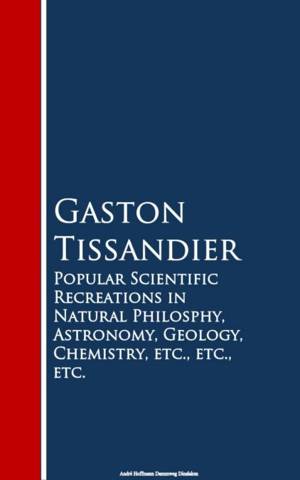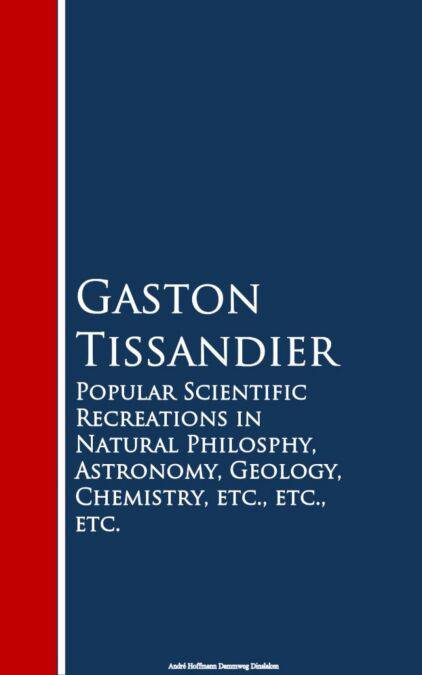
Bedankt voor het vertrouwen het afgelopen jaar! Om jou te bedanken bieden we GRATIS verzending (in België) aan op alles gedurende de hele maand januari.
- Afhalen na 1 uur in een winkel met voorraad
- In januari gratis thuislevering in België
- Ruim aanbod met 7 miljoen producten
Bedankt voor het vertrouwen het afgelopen jaar! Om jou te bedanken bieden we GRATIS verzending (in België) aan op alles gedurende de hele maand januari.
- Afhalen na 1 uur in een winkel met voorraad
- In januari gratis thuislevering in België
- Ruim aanbod met 7 miljoen producten
Zoeken
Popular Scientific Recreations in Natural Philosophy, Astronomy, Geology, Chemistry E-BOOK
Gaston Tissandier
E-book | Engels
€ 0,99
Omschrijving
A learned mathematician of the seventeenth century, Ozanam by name, a member of the Academy of Sciences and author of several distinguished works, did not think it derogatory to his dignity to write, under the title of "Mathematical and Physical Recreations," a book designed for the amusement of youth, in which science lends itself to every pastime, even jugglery and tricks of legerdemain.
"Jeux d'esprit" says Ozanam, "are for all seasons and all ages; they instruct the young, they amuse the old, they are welcomed by the rich, and are not above the reach of the poor."
The object of the book now presented to the reader is also to instruct while it amuses, but we have not thought proper to make use, as Ozanam did, of any physical feats, so called amusing. Such do not constitute experiments, and are but ingenious deceptions, intended to disguise the true mode of operation, and we have not desired to make use of or popularise such methods. We wish, on the contrary, that every game we describe, every pastime or amusement of which we give the exposition, should be rigorously based on the scientific method, and looked upon as a genuine exercise in physics, chemistry, mechanics, or natural science. It does not appear to us desirable to teach deception, even in play.
Science in the open air, in the fields, in the sunshine, is our first study; we point out how, in the country, it is possible, pleasantly and unceasingly, to occupy one's leisure in observing nature, in capturing insects or aquatic animals, or in noting atmospheric phenomena.
We next teach a complete course of physics without any apparatus, and point out the methods for studying the different phenomena[Pg v] of heat, light, optics, and electricity, by means of a simple water-bottle, tumbler, stick of sealing-wax, and other ordinary objects, such as everyone has at hand.
"Jeux d'esprit" says Ozanam, "are for all seasons and all ages; they instruct the young, they amuse the old, they are welcomed by the rich, and are not above the reach of the poor."
The object of the book now presented to the reader is also to instruct while it amuses, but we have not thought proper to make use, as Ozanam did, of any physical feats, so called amusing. Such do not constitute experiments, and are but ingenious deceptions, intended to disguise the true mode of operation, and we have not desired to make use of or popularise such methods. We wish, on the contrary, that every game we describe, every pastime or amusement of which we give the exposition, should be rigorously based on the scientific method, and looked upon as a genuine exercise in physics, chemistry, mechanics, or natural science. It does not appear to us desirable to teach deception, even in play.
Science in the open air, in the fields, in the sunshine, is our first study; we point out how, in the country, it is possible, pleasantly and unceasingly, to occupy one's leisure in observing nature, in capturing insects or aquatic animals, or in noting atmospheric phenomena.
We next teach a complete course of physics without any apparatus, and point out the methods for studying the different phenomena[Pg v] of heat, light, optics, and electricity, by means of a simple water-bottle, tumbler, stick of sealing-wax, and other ordinary objects, such as everyone has at hand.
Specificaties
Betrokkenen
- Auteur(s):
- Uitgeverij:
Inhoud
- Aantal bladzijden:
- 1680
- Taal:
- Engels
Eigenschappen
- Productcode (EAN):
- 9783736416253
- Verschijningsdatum:
- 29/09/2016
- Uitvoering:
- E-book
- Beveiligd met:
- Digital watermarking
- Formaat:
- ePub

Alleen bij Standaard Boekhandel
Beoordelingen
We publiceren alleen reviews die voldoen aan de voorwaarden voor reviews. Bekijk onze voorwaarden voor reviews.









